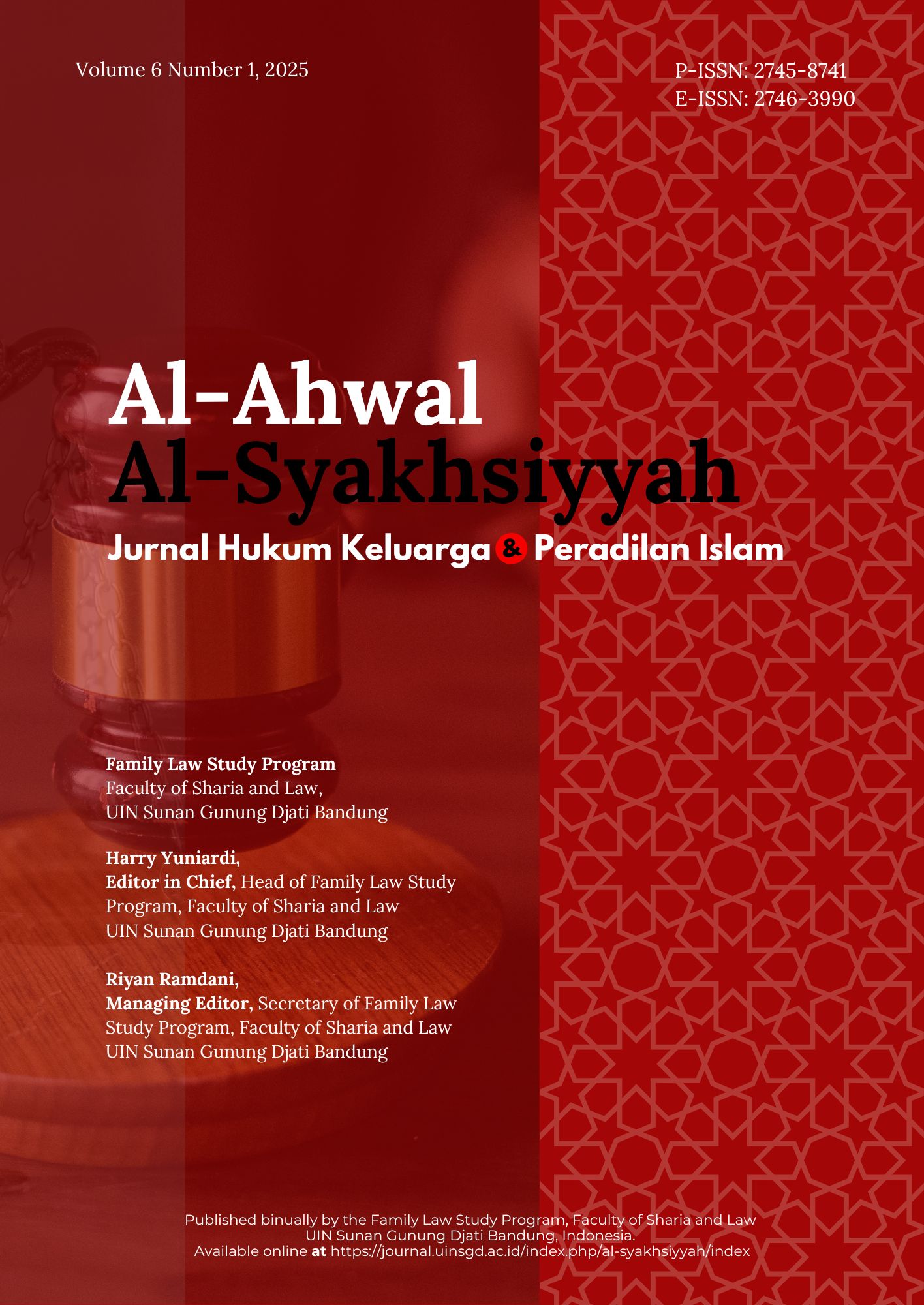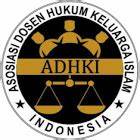Hak Asuh Anak Pasca Perceraian Dalam Perspektif Hukum Keluarga Islam: Studi Di Kabupaten Pangkep
DOI:
https://doi.org/10.15575/as.v6i1.44657Keywords:
Divorce, Hadhanah, Child CustodyAbstract
This study analyzes post-divorce child custody as an important aspect in the context of Islamic family law. This article examines various aspects of post-divorce child custody, focusing on the Islamic legal framework. Through an analysis of the perspective of Islamic family law, this article discusses the rights and obligations of parents towards children, the role of the court in determining custody, and the principles that guide the post-divorce child custody process. This study aims to provide an in-depth understanding of the concepts of Islamic family law related to child custody, and their implications for child welfare in divorce situations. The method used in this study is a qualitative method with data collection used, namely data by collecting from the results of observations, documentation, and interviews. The results of the study obtained are the implementation of child custody after divorce in Pangkep Regency in reality does not comply with the decision of the Religious Court with the existence of obstacles, obstacles in the Implementation of Child Custody After Divorce in Pangkep Regency are as follows: Lack of sense of responsibility of the mother, the mental condition of the mother who is not ready to face divorce, lack of religious knowledge of the mother and the solution to these obstacles is: providing an understanding to the mother of a sense of responsibility that the child is a trust from Allah and will be accounted for, providing an understanding that not every divorce has a negative impact, increasing religious understanding that Allah has predestined divorce. The conclusion of this article provides insight into how Islamic family law regulates child custody after divorce by considering legal aspects, ethics, and the best interests of the child.
References
Ariani, Andi Irma, ‘Dampak Perceraian Orang Tua Dalam Kehidupan Sosial Anak’, Phinisi Integration Review, 2.2 (2019), p. 257, doi:10.26858/pir.v2i2.10004
Indriani, Dewi, M. Mabrur Haslan, and M. Zubair, ‘Dampak Perceraian Orang Tua Terhadap Motivasi Belajar Anak’, Jurnal Pendidikan Sosial Keberagaman, 5.1 (2018), pp. 65–79, doi:10.29303/juridiksiam.v5i1.74
Mone, Harry Ferdinand, ‘Dampak Perceraian Orang Tua Terhadap Perkembangan Psikososial Dan Prestasi Belajar’, Harmoni Sosial: Jurnal Pendidikan IPS, 6.2 (2019), pp. 155–63, doi:10.21831/hsjpi.v6i2.20873
No, Vol, Meminimalisir Perceraian, Dewi Wahyuni Mustafa, Besse Muqita Dewi, Andi Wahyuddin Nur, Institut Ilmu, and others, ‘LEGAL : Journal of Law’, 2.2 (2023), pp. 95–106
Ridwan, Muhammad, ‘Al-Iqtisodiyah : Jurnal Ilmu Hukum Dan Hukum Keluarga Islam’, pp. 11–20
ulfa, zilpia maria, ‘TINJAUAN SOSIOLOGI HUKUM ISLAM TERHADAP DAMPAK PERCERAIAN DI LUAR PENGADILAN (Studi Kasus Di Desa Jineng Kecamatan Wanasaba Kabupaten Lombok Timur)’, 2022, pp. 1–23
Untari, Ida, Kanissa Puspa Dhini Putri, and Muhammad Hafiduddin, ‘Dampak Perceraian Orang Tua Terhadap Kesehatan Psikologis Remaja’, Profesi (Profesional Islam) : Media Publikasi Penelitian, 15.2 (2018), p. 106, doi:10.26576/profesi.272
Veronika, Nabila, Pradana Chairy Azhar, and Azri Ranuwaldy Sugma, ‘Dampak Psikologi Pada Anak’, 3.1 (2022), pp. 30–37
Wardani, Ach. Khiarul Waro, ‘Memahami Konflik Keluarga Melalui Pendekatan Sosiologi Hukum Islam (Studi Lapangan Di Pengadilan Agama Kota Kediri)’, Mahakim: Journal of Islamic Family Law, 6.2 (2022), pp. 177–206, doi:10.30762/mahakim.v6i2.165
Widiastuti, Reski Yulina, ‘Dampak Perceraian Pada Perkembangan Sosial Dan Emosional Anak Usia 5-6 Tahun’, Jurnal PG-PAUD Trunojoyo, 2.2 (2015), pp. 76–149
Zayyadi, Ahmad, ‘Dinamika Modernisasi Hukum Islam: Tinjauan Historis Dalam Pembacaan Mazhab Sociological Jurisprudence’, Al-Manahij: Jurnal Kajian Hukum Islam, 14.1 (2020), pp. 99–112, doi:10.24090/mnh.v14i1.1800
Zidni, M. Irpan, ‘Tinjauan Sosiologi Hukum Terhadap Tingginya Angka Perceraian Di Pengadilan Agama Sumber Kabupaten Cirebon (2016-2019)’, Tesis, 2020, pp. 1–187
1i02.303.
jahroh siti. “Perspektif Fiqh Perempuan Pembelajaran Fiqh Munakahat.” Agama Dan Hak Asasi Manusia 4, no. 1 (2014): 256–82.
Kemenag RI, Dirjen Bimas Islam.
Kompilasi Hukum Islam Di Indonesia. Jakarta: Direktorat Bina KUA, 2018.
Muklisin. “The Kafaah Concept Of The Sakinah Family In Muslim” 10, no. 1 (2023): 148–64.
Muqaffi, Ahmad, Rusdiyah, and Diana Rahmi. “Menilik Problematika
Dispensasi Nikah Dalam Upaya
Pencegahan Pernikahan Anak Pasca Revisi UU Perkawinan.” Journal of
Islamic and Law Studies 5, no. 3 (2021).
Susilo, Edi. “ANALASIS KOMPARATIF PANDANGAN IMAM MADZHAB TENTANG STATUS PERNIKAHAN SUAMI MAFQUD DALAM HUKUM
ISLAM.” YUSTISI 12, no. 1
(February 1, 2025): 277–91.
https://doi.org/10.32832/YUSTISI
.V12I1.19002.
Zahid, Moh. “PERPADUAN HUKUM ISLAM DAN HUKUM ADAT
(Upaya Merumuskan Hukum Islam Berkepribadian Indonesia).” AL-
IHKAM: Jurnal Hukum & Pranata Sosial 1, no. 1 (September 2019): 57–
68. https://doi.org/10.19105/al- lhkam.v1i1.2552.
Downloads
Published
How to Cite
Issue
Section
Citation Check
License
Copyright (c) 2025 Sikra Sikra, Agus Muchsin, Ali Rusdi, Hannani Hannani, Rahmawati Rahmawati

This work is licensed under a Creative Commons Attribution-NonCommercial-ShareAlike 4.0 International License.





